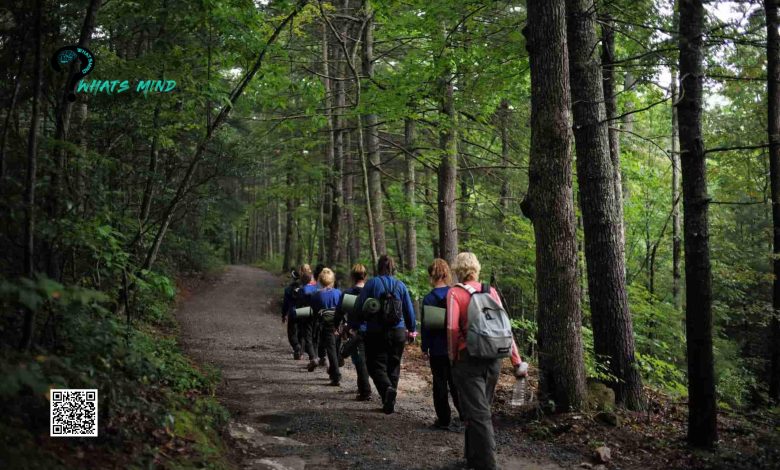Introduction to Trails Carolina
Uncovering the truth behind wilderness therapy programs is vital, shedding light on their practices and holding them accountable for the well-being of vulnerable young individuals. In recent months, an investigation has brought attention to Trails Carolina, a renowned wilderness therapy program that aims to help struggling adolescents navigate their challenges. The findings of this investigation have raised concerns about the treatment methods employed at Trails Carolina and sparked a call for increased scrutiny within the industry. Join us as we delve into these revelations and explore the steps being taken to address these issues head-on. It’s time to ensure that our youth receive compassionate care in their journey towards healing and growth.
Overview of the investigation findings
Trails Carolina, a renowned wilderness therapy program, was recently scrutinized following an investigation into its practices. The findings of this investigation shed light on some concerning aspects of the program.
One of the key findings was that there were instances where staff members needed more proper training and qualifications to deal with the unique challenges faced by participants effectively. This raised questions about the overall safety and effectiveness of the program.
Additionally, it was revealed that there were issues regarding transparency and communication between staff members and families. Many parents expressed frustration about being adequately informed about their child’s progress or potential concerns.
Furthermore, allegations of mistreatment and neglect surfaced during the investigation. These claims pointed towards a lack of accountability within Trails Carolina and highlighted potential gaps in their systems for monitoring participant well-being.
These findings are deeply troubling as they raise serious doubts about the ability of Trails Carolina to provide a safe and supportive environment for its participants. These issues must be addressed promptly to ensure the well-being and success of those seeking help through wilderness therapy programs like Trails Carolina.
While it is important to note that every organization can face challenges or shortcomings, Trails Carolina needs to respond immediately to these findings. This may involve implementing comprehensive training programs for staff members, establishing better lines of communication with families, ensuring strict adherence to safety protocols, and improving oversight mechanisms within their operations.
The impact of this investigation on Trails Carolina cannot be understated. It has overshadowed their reputation as a leading wilderness therapy provider. Families considering enrolling their children may now question whether this program can safely meet their needs.
It is imperative that other wilderness therapy programs also take note of this incident. Transparency should be prioritized across all organizations in this field so that parents can make informed decisions when seeking treatment options for struggling adolescents.
While Trails Carolina’s “investigation” has unearthed significant concerns surrounding its practices, it also presents an opportunity for growth and change within the industry. By addressing
The impact of the investigation on Trails Carolina
The recent investigation into Trails Carolina has significantly impacted the program and its reputation. The investigation findings have shed light on some concerning practices within the wilderness therapy program, leading to increased scrutiny from parents and industry professionals.
One of the main impacts of the investigation is a decrease in trust among parents considering sending their children to Trails Carolina. With allegations of abuse and neglect coming to light, many parents hesitate to entrust their children’s well-being to this program. Any therapeutic environment needs to prioritize safety and provide a nurturing space for healing, which Trails Carolina may need to re-establish to regain trust.
In addition, the investigation has also put pressure on other wilderness therapy programs across the country. Parents are now more aware of these programs’ potential risks and demand increased transparency and accountability from all providers. This heightened awareness may lead to stricter regulations being implemented throughout the industry, ensuring that children receive appropriate care during their therapeutic journey.
Trails Carolina itself has taken steps in response to the investigation findings. They have implemented new policies to prevent abuse or neglect within their program, including enhanced staff training protocols and increased oversight measures. These actions demonstrate an acknowledgment of past shortcomings and a commitment to improvement.
Addressing issues within wilderness therapy programs is crucial for individual organizations and safeguarding vulnerable adolescents who require therapeutic intervention. The focus should be on providing effective treatment while prioritizing safety, emotional well-being, and ethical practices.
It is important to note that not all wilderness therapy programs face similar allegations or investigations as Trails Carolina does; however, it serves as a reminder that constant evaluation and improvement are necessary across all providers to maintain high standards of care.
This investigation has brought attention to Trails Carolina and highlighted broader concerns within wilderness therapy programs nationwide. It calls for increased vigilance by parents seeking appropriate treatment options for their children and industry professionals ensuring the well-being of vulnerable youth. By addressing these issues head
Steps taken by Trails Carolina in response to the investigation
Trails Carolina, a renowned wilderness therapy program, has taken swift and proactive measures in response to the recent investigation into their practices. Recognizing the importance of addressing any concerns raised, they have implemented several changes to ensure their participants’ safety and well-being.
Trails Carolina has enhanced their staff training programs. They now provide extensive training on ethical guidelines, mental health support techniques, crisis management, and de-escalation strategies. This ensures all staff members have the skills to handle various situations effectively.
Additionally, Trails Carolina has strengthened their protocols for participant assessment and evaluation. They have implemented more rigorous screening processes during intake to ensure individuals who may not be suitable for the program are identified early on. This helps create an environment where participants can thrive and receive appropriate care tailored to their needs.
Furthermore, Trails Carolina is actively working towards improving communication channels between participants’ families and staff members. They understand that open lines of communication play a crucial role in fostering trust and transparency within the program.
Moreover, they have committed to conducting regular internal reviews of policies and procedures. By doing so, they can identify areas that require improvement or modification based on feedback from participants and external professionals.
Lastly but importantly, Trails Carolina has engaged independent third-party organizations specializing in research and clinical practice within wilderness therapy programs to conduct ongoing evaluations of their operations. These evaluations aim to provide objective insights into areas for further enhancements.
In conclusion
Trails Carolina’s response to the investigation demonstrates its commitment to continuous improvement in delivering practical and ethical wilderness therapy experiences for youth. Through implementing changes such as enhancing staff training programs, strengthening assessment protocols, and improving communication channels with families – they are setting an example for other programs within this industry.
This proactive approach signifies that Trails Carolina takes accountability seriously while prioritizing participant safety.
The importance of addressing issues in wilderness therapy programs
Addressing issues in Wildernes’s therapy programs is of ut
most significance for the well-being and safety of participants. These programs are designed to provide therapeutic experiences in natural settings but can have serious consequences when issues arise. These programs must prioritize the physical and emotional safety of their participants.
One key aspect of addressing issues is proper staff training and supervision. Wilderness therapy programs must ensure their staff are adequately trained in outdoor skills, therapeutic techniques, and crisis management. This includes understanding trauma-informed care, conflict resolution strategies, and mental health support.
Additionally, effective communication channels need to be established within these programs. Participants should feel comfortable expressing concerns or grievances without fear of retribution or judgment. Program administrators should actively listen to feedback from both participants and their families to identify areas for improvement.
Regular program evaluations are another essential component in addressing issues. By conducting thorough assessments regularly, program administrators can identify potential problems before they escalate into more significant issues. This proactive approach allows them to make necessary adjustments to enhance the overall quality and safety of the program.
Moreover, collaboration with external organizations such as accreditation bodies or regulatory agencies can help ensure accountability within wilderness therapy programs. Seeking third-party oversight helps maintain transparency and provides additional protection for participants.
In conclusion (as per instruction), addressing issues in wilderness therapy programs is vital for protecting the welfare of those involved. By prioritizing staff training, promoting open communication channels, conducting regular evaluations, and seeking external oversight, these programs can work towards providing safe and effective therapeutic experiences for all participants.
Other wilderness therapy programs under scrutiny
In the wake of the Trails Carolina investigation, it has become evident that other wilderness therapy programs are also facing scrutiny. Concerns have been raised about the safety and effectiveness of these programs, prompting a closer look at their practices and protocols.
One such program is Wilderness Quest, which has recently come under fire for alleged mistreatment of participants. Disturbing reports have surfaced regarding emotional abuse and neglect within their program. These allegations highlight the urgent need for increased regulation and oversight in the industry.
Another program facing scrutiny is Summit Achievement. While they have not faced any specific investigations thus far, there are growing concerns about their approach to therapeutic interventions. Critics argue that more research must be done to evaluate the long-term outcomes of participants who complete this program.
There are systemic issues within the wilderness therapy industry that must be addressed. The well-being and safety of vulnerable individuals should always be our top priority. We must demand greater transparency, accountability, and evidence-based practices from all wilderness therapy programs.
As concerned citizens, we must call for increased regulation by government agencies to ensure proper training and qualifications for staff members, adherence to ethical guidelines, regular audits of safety measures, and comprehensive outcome assessments.
The recent investigations into Trails Carolina are a wake-up call for the entire industry. We cannot afford to look the other way or dismiss these issues as isolated incidents. It is time for change – a change that prioritizes participant welfare over profit margins.
By shining a light on problematic practices within wilderness therapy programs like Trails Carolina – those marked by abuse or negligence -we can work towards creating an environment where individuals can truly heal and grow during their therapeutic journey in nature’s embrace.
Conclusion and call for change in the industry
The recent investigation into Trails Carolina has shed light on the potential issues within wilderness therapy programs. While it is disheartening to hear about the experiences of some participants, this investigation should serve as a wake-up call for the entire industry.
Trails Carolina has addressed the investigation’s findings by implementing new safety measures, enhancing staff training, and improving communication channels with families. These actions are commendable and show a commitment to making necessary changes.
However, it is crucial that other wilderness therapy programs also take these allegations seriously and conduct thorough internal reviews. The well-being and safety of young individuals should always be prioritized above all else.
Parents or guardians considering enrolling their child in a wilderness therapy program must thoroughly research and vet any prospective programs. Look for evidence of accreditation, qualified staff members, appropriate licensing, and transparent policies regarding participant safety.
Furthermore, government agencies should strengthen regulations surrounding wilderness therapy programs to ensure accountability across the board. This means establishing clear guidelines for best practices regarding participant care, staff qualifications, program structure, emergency procedures, etc.
By working together as an industry and holding ourselves accountable for providing safe environments for participants in wilderness therapy programs such as Trails Carolina or others facing scrutiny like Aspen Education Group’s Wilderness Therapy Programs or Anasazi Foundation’s Outdoor Behavioral Healthcare Programs, we can begin to rebuild trust among families seeking help for their struggling children.
It is time for a change in the industry that focuses on safeguarding vulnerable individuals who turn to these programs seeking healing and growth. Let us come together with compassion towards those who need our support most – our youth – so they may find solace amidst nature without fear or harm.
Also Read: Niles Garden Circus






